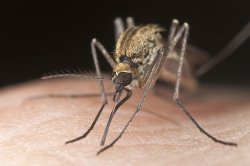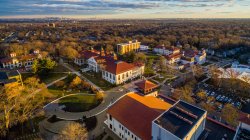Developing New Treatments for Malaria
Almost half of the people in the world — especially those living in Sub-Saharan Africa, Asia and Latin America — currently risk contracting malaria. In 2016, the Medicines for Malaria Venture estimated that 216 million cases of malaria occurred worldwide, leading to 445,000 deaths.
Malaria spreads to humans who are bitten by mosquitoes infected with Plasmodium – a single-cell parasite. While a number of antimalarial medications are available, the appearance of drug-resistant strains of Plasmodium has sparked renewed urgency in the search for novel antimalarial agents. David Rotella, Sokol Professor of Chemistry, and John Siekierka, Sokol Professor of Medicinal Chemistry and director of the University’s Margaret and Herman Sokol Institute for Pharmaceutical Life Sciences, are collaborating with researchers at Rutgers University on a new potential drug target in Plasmodium.
It may be possible to combine this with other antimalarial drugs to treat infection and reduce or very hopefully prevent resistance from developing.
Rotella, Siekierka and the Rutgers researchers are sharing a $1.5 million award from the National Institutes of Health’s National Institute of Allergy and Infectious Disease (NIH NIAID), with Montclair State receiving approximately $770,000 over the three-year term of the grant.

“We’re investigating inhibitors of a protein kinase found in Plasmodium that plays multiple roles in its life cycle,” says Rotella. “The most important point of this research is to attempt to confirm if this enzyme can inhibit the parasitic life cycle of Plasmodium at more than one point. If we can demonstrate that, it may be possible to combine this with other antimalarial drugs to treat infection and reduce or very hopefully prevent resistance from developing.”
According to Rotella, undergraduate, graduate and postdoctoral students are working in his and Siekierka’s labs on the project.
“This research,” notes Rotella, “is being done as part of the Sokol Institute’s mission to carry out academic drug discovery and help train new scientists to work in the field.”
